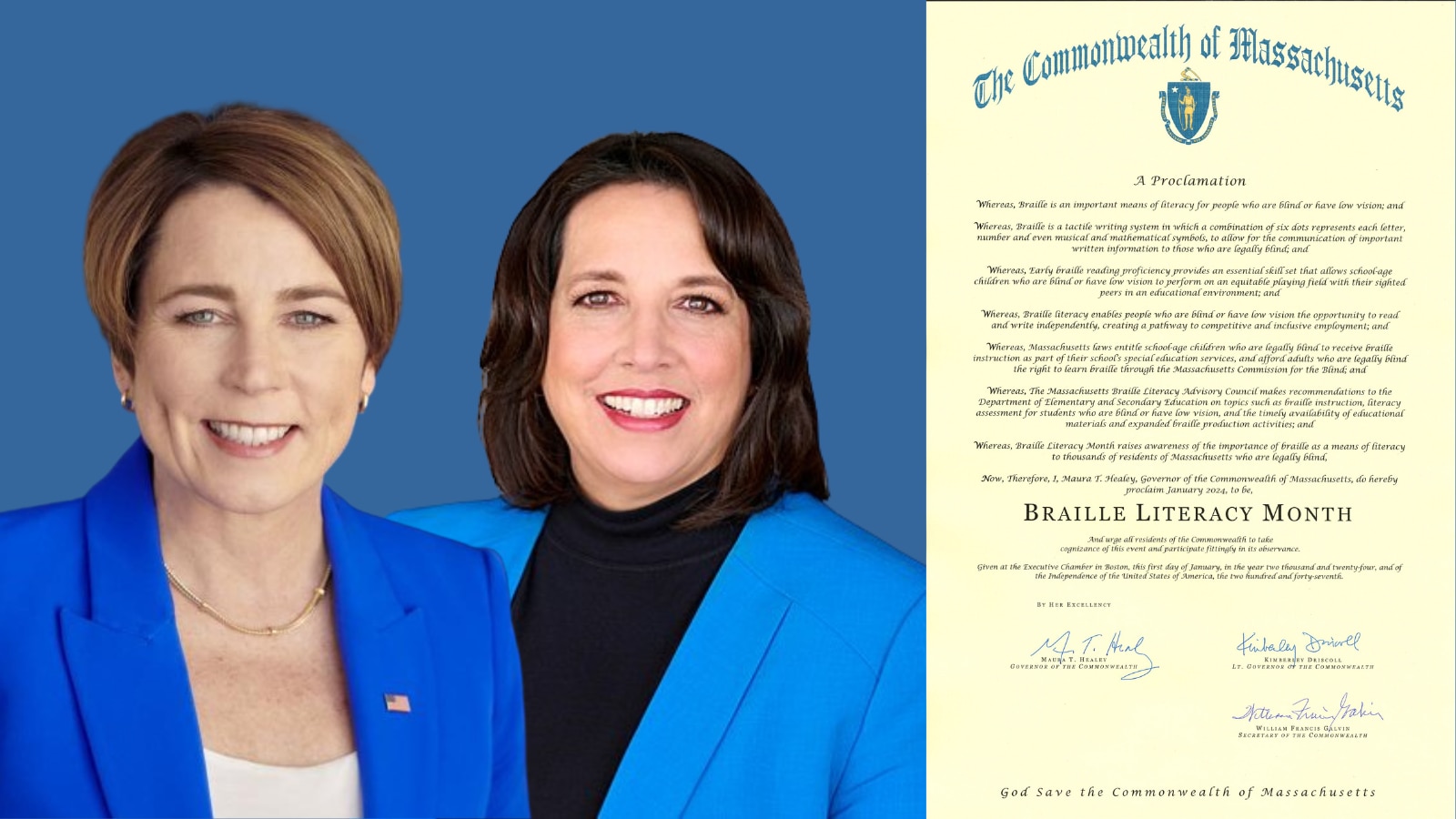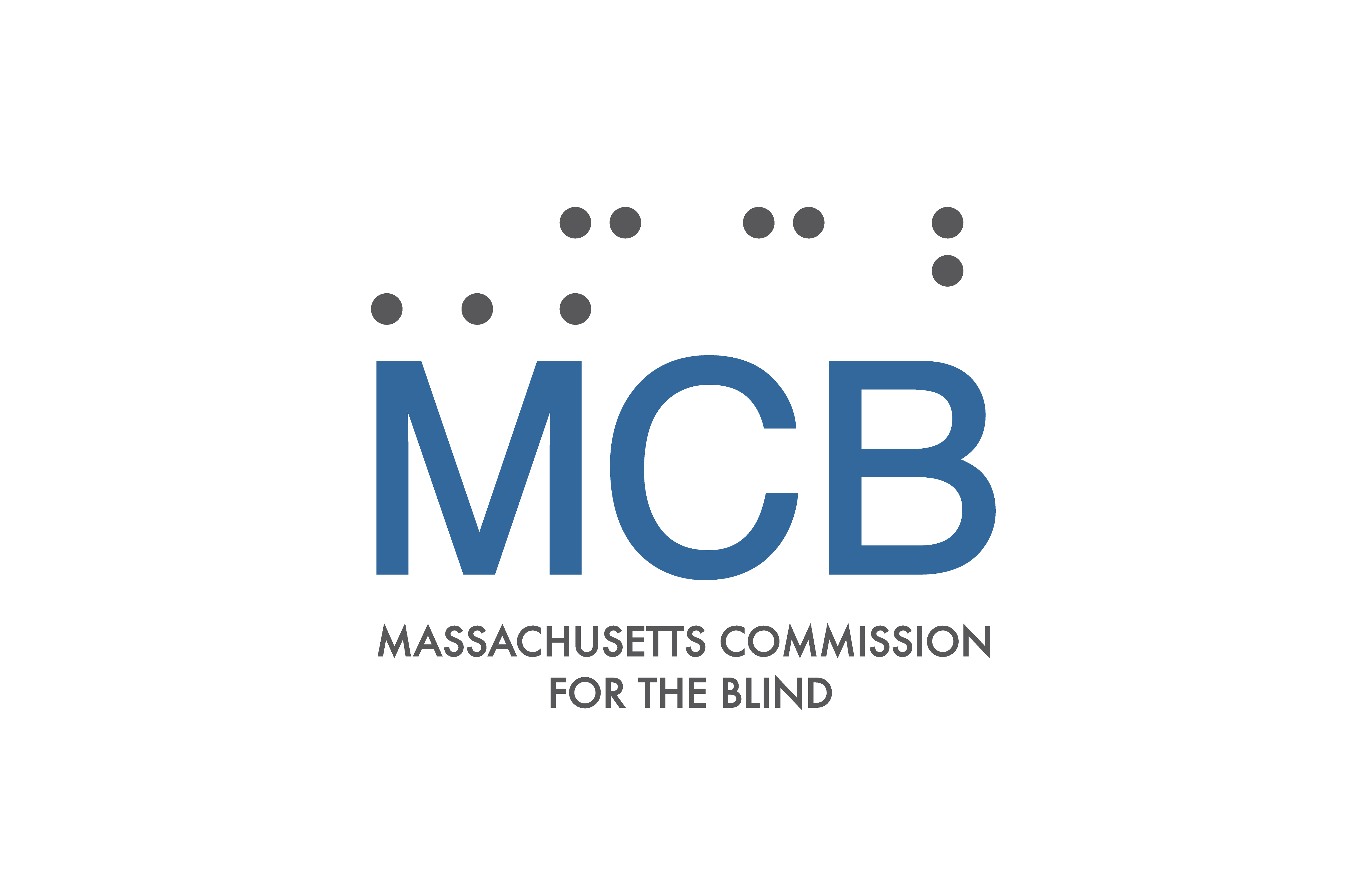- Massachusetts Commission for the Blind
Media Contact
Mike Saccone, Director of Communications

BOSTON — The Healey-Driscoll Administration has proclaimed January as Braille Literacy Month in Massachusetts to raise awareness of the importance of braille as a means of literacy for people who are blind or have low vision. Braille literacy enables those who use it to read and write independently and creates a pathway to academic success and employment possibilities.
Braille is a tactile writing system in which a combination of six dots represents letters, numbers, and even musical and mathematical symbols, to allow for the communication of written information.
“Braille Literacy Month helps us be mindful of the importance of braille to so many Massachusetts residents,” said Governor Maura Healey. “Together, we can work to expand the use of braille to increase literacy and give equal access to people who are blind or have low vision.”
“Braille is vital to literacy, independence, and empowerment as it allows people who are blind or have low vision to access information on their own,” said Lt. Governor Kimberley Driscoll. “Braille Literacy Month gives us an opportunity as an administration to raise awareness on the importance of Braille.”
“Braille opens up the world and allows access to the many rewards of literacy,” said Health and Human Services Secretary Kate Walsh. “This can include intellectual freedom, educational advancement, personal independence, security, equity, and economic opportunity.”
“For almost two centuries, the braille system has continued to open doors of learning and opportunity for people who are blind or have low vision,” said Massachusetts Commission for the Blind Commissioner John Oliveira. “Even with advances in technology, such as audiobooks and screen readers, braille is still as relevant today in the digital world as paper and pen are to people who are sighted.”
In Massachusetts, laws entitle school-age children who are legally blind to receive braille instruction as part of their school’s special education services and afford adults who are legally blind the right to learn braille through the Massachusetts Commission for the Blind.
"Literacy is a top priority for this administration, and we know that we only succeed when all of our learners succeed, including students who may be blind or low vision," said Secretary of Education Dr. Patrick Tutwiler. "As we celebrate Braille Literacy Month, please join us in an effort to create more awareness about the importance of braille and its benefits."
“As we work to improve literacy for all students, we’re happy to celebrate Braille Literacy Month,” said Elementary and Secondary Education Commissioner Jeffrey C. Riley. “Learning braille is an important way for students who are blind or have low vision to access their school materials and other resources independently.”
The Braille Literacy Advisory Council makes recommendations to the Department of Elementary and Secondary Education on topics such as braille instruction, literacy assessment for students who are blind or have low vision, and the timely availability of educational materials and expanded braille production activities.
###
Statements of Support
Kim Charlson, Chair, World Blind Union’s World Braille Council; Executive Director, Perkins School for the Blind Braille and Talking Book Library:
"Every year, the United Nations recognizes January as the time for the global blindness community to come together to celebrate Louis Braille, the inventor of the braille writing system, and all that it has contributed to the lives of people who are blind. Not only is this an opportunity for Massachusetts to celebrate all that is Braille, but Braille Literacy Month is also a time to take stock of what further actions can be put into place to expand availability to braille and ensure that blind people across the Commonwealth, and the world, have full access to this life-changing tool.”
James Lonergan, Director, Massachusetts Board of Library Commissioners:
“Everyone should be able to experience the joy of reading and lifelong learning. Working with our partners at the Perkins Library and at the Worcester Talking Book Library, increased state funding is leading to improved library services for people with vision loss, including expanded access to electronic and downloadable audio and Braille materials, Braille instruction, and new adaptive technologies. The ability to read affects an individual’s independence, ability to earn a living, and self-esteem. Braille plays a vital role in ensuring that everyone can read freely, participate in, and contribute to communities, and stay connected to the world around them. We applaud the Governor for highlighting its importance.”
Kathryn Pontes, Programming and Outreach Librarian, Worcester Talking Book Library:
"Braille literacy plays a fundamental role in enabling fuller participation in society, from expanded educational and employment opportunities to, of course, access to a wider range of books and other text! WTBL patrons can access braille materials in both hard copy and through the BARD (Braille and Audio Reading Download) app. This year, the NLS also rolled out the Braille-on-Demand program, which allows patrons to request up to five braille hardcopy items each month to keep in perpetuity. Whether blind and visually impaired folks read braille, audio, or large print, WTBL is here to facilitate access for all print-disabled readers.”
Brian Mac Donald, President and CEO, National Braille Press:
“Braille is literacy by definition. Reading and writing with braille supports learning grammar, spelling, and punctuation. Braille literacy provides a path that can lead to successful employment and greater independence in life.”
Carrie Brasier, Director, Massachusetts Accessible Instructional Materials (AIM) Library:
“Braille literacy increases knowledge, opening doors for higher education and employment opportunities, strengthening an individual’s overall independence and success.”
Kate Crohan, Teacher of the Visually Impaired, Perkins School for the Blind:
"Braille literacy can be the key to knowledge and independence. Using braille to read books, take notes, label items, or even deliver a speech offers choices to individuals that wouldn't otherwise be possible. Although there is an abundance of audio content available today, as overall literacy rates decline, the written word, whether in braille or print, remains critical as it exposes young readers to spelling, punctuation and more."
###
